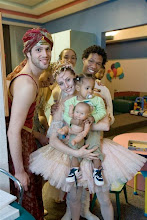Ballet Memphis has a core value of creating work that has meaning, and another core value that everyone in our society matters. Therefore, issues around who has a place at the table continue to be thread through the tapestry of performances we produce. This AbunDANCE: Where the Girls Are 2 is a part of an important national conversation, and naturally of great interest to me as I look back on the 24 years of our Ballet Memphis journey, plan for our future, and continue to make sure that what we do in our community has artistic, conceptual merit, and touches the deep concerns of the people with whom we live.
Today, more than half of the students in universities are women. In law school and medical school, the numbers are also reflecting this trend. Yet in ballet, there are only four women who direct fully developed, nationally respected ballet companies. How is this, when the great preponderance of young ballet students and their teachers are female? The voice of women in our field still needs nurturing, and serious questions need to be asked about patriarchal hierarchy and unconscious acceptance of old practices, attitudes and decisions.
In our performances in this two week run, you are seeing examples from some of the most thoughtful women in dance creation. Another work is a deeply personal creation by a former member of our company about the women who raised him in the Baltimore projects. There is also a fusion project between Emily Coates and Lacina Coulibaly of Burkina Faso which has in part evolved into a work that reflects women’s strength in supporting community.
Support is a rich word. It implies an ability to leave one’s self and assist another. In Kate Chopin's The Awakening, choreographed by our new Artistic Associate, Julia Adam, Edna cannot find a way to discover feelings and express her need to lead a life of her own; her conventional society exacerbates her yearning, her sense of living a caged life, and she tragically sees no way out of her sorrow. The palette of the work is pastel, yet that very softness points out how lost she is, how unclear her options seem.
Damien Patterson’s Four Women homage to the women who raised him points out a different time, a different place, built on the backdrop of the racial and gender struggle in America which he has known. These women supported one another, and it is this support from which they drew their strength.
Wednesday, February 2, 2011
Subscribe to:
Post Comments (Atom)












No comments:
Post a Comment